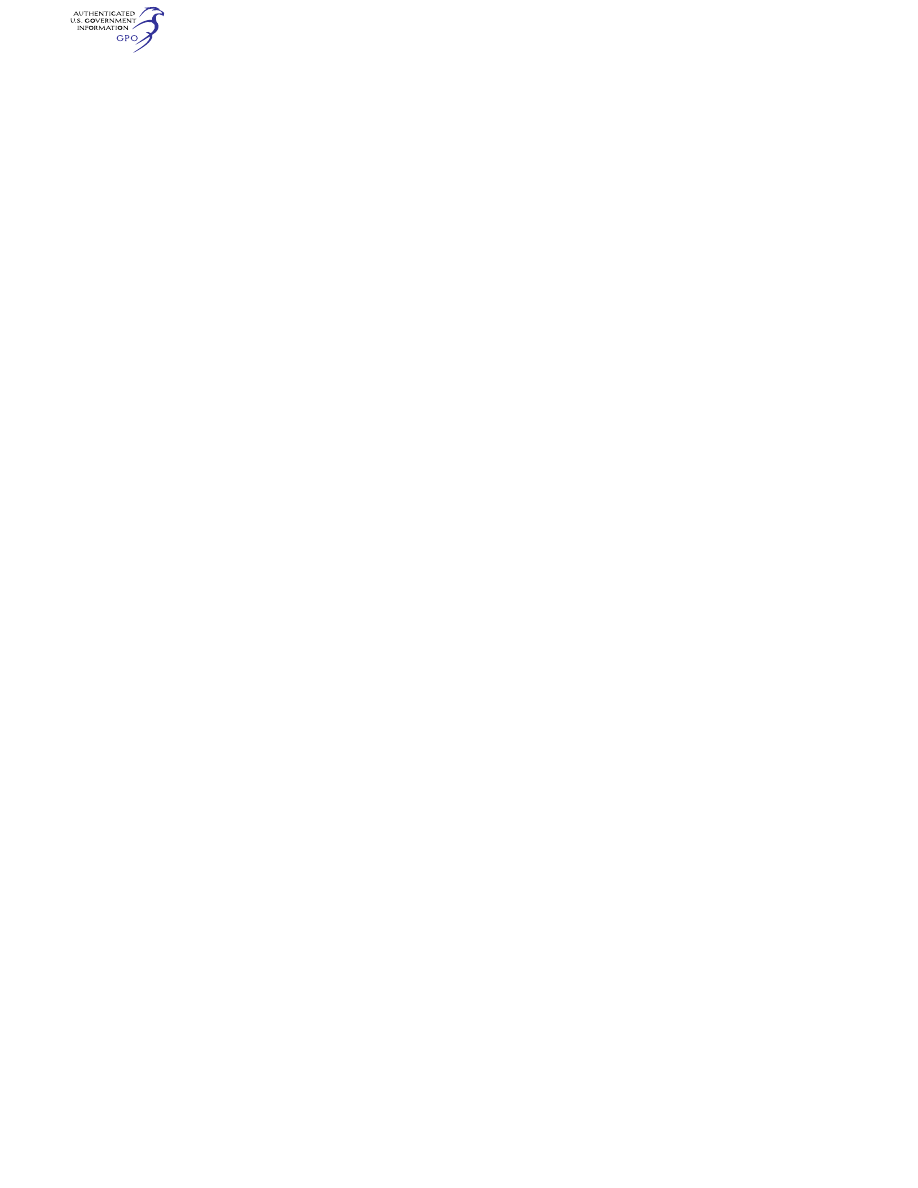
489
Federal Aviation Administration, DOT
§ 27.2
27.1325
Static pressure systems.
27.1327
Magnetic direction indicator.
27.1329
Automatic pilot and flight guidance
system.
27.1337
Powerplant instruments.
E
LECTRICAL
S
YSTEMS AND
E
QUIPMENT
27.1351
General.
27.1353
Energy storage systems.
27.1357
Circuit protective devices.
27.1361
Master switch.
27.1365
Electric cables.
27.1367
Switches.
L
IGHTS
27.1381
Instrument lights.
27.1383
Landing lights.
27.1385
Position light system installation.
27.1387
Position light system dihedral an-
gles.
27.1389
Position light distribution and in-
tensities.
27.1391
Minimum intensities in the hori-
zontal plane of forward and rear position
lights.
27.1393
Minimum intensities in any vertical
plane of forward and rear position lights.
27.1395
Maximum intensities in overlapping
beams of forward and rear position
lights.
27.1397
Color specifications.
27.1399
Riding light.
27.1401
Anticollision light system.
S
AFETY
E
QUIPMENT
27.1411
General.
27.1413
Safety belts.
27.1415
Ditching equipment.
27.1419
Ice protection.
27.1435
Hydraulic systems.
27.1457
Cockpit voice recorders.
27.1459
Flight data recorders.
27.1461
Equipment containing high energy
rotors.
Subpart G—Operating Limitations and
Information
27.1501
General.
O
PERATING
L
IMITATIONS
27.1503
Airspeed limitations: general.
27.1505
Never-exceed speed.
27.1509
Rotor speed.
27.1519
Weight and center of gravity.
27.1521
Powerplant limitations.
27.1523
Minimum flight crew.
27.1525
Kinds of operations.
27.1527
Maximum operating altitude.
27.1529
Instructions for Continued Air-
worthiness.
M
ARKINGS AND
P
LACARDS
27.1541
General.
27.1543
Instrument markings: general.
27.1545
Airspeed indicator.
27.1547
Magnetic direction indicator.
27.1549
Powerplant instruments.
27.1551
Oil quantity indicator.
27.1553
Fuel quantity indicator.
27.1555
Control markings.
27.1557
Miscellaneous markings and plac-
ards.
27.1559
Limitations placard.
27.1561
Safety equipment.
27.1565
Tail rotor.
R
OTORCRAFT
F
LIGHT
M
ANUAL AND
A
PPROVED
M
ANUAL
M
ATERIAL
27.1581
General.
27.1583
Operating limitations.
27.1585
Operating procedures.
27.1587
Performance information.
27.1589
Loading information.
A
PPENDIX
A
TO
P
ART
27—I
NSTRUCTIONS FOR
C
ONTINUED
A
IRWORTHINESS
A
PPENDIX
B
TO
P
ART
27—A
IRWORTHINESS
C
RI
-
TERIA
FOR
H
ELICOPTER
I
NSTRUMENT
F
LIGHT
A
PPENDIX
C
TO
P
ART
27—C
RITERIA FOR
C
AT
-
EGORY
A
A
PPENDIX
D
TO
P
ART
27—HIRF E
NVIRON
-
MENTS AND
E
QUIPMENT
HIRF T
EST
L
EV
-
ELS
A
UTHORITY
: 49 U.S.C. 106(f), 106(g), 40113,
44701–44702, 44704.
S
OURCE
: Docket No. 5074, 29 FR 15695, Nov.
24, 1964, unless otherwise noted.
Subpart A—General
§ 27.1
Applicability.
(a) This part prescribes airworthiness
standards for the issue of type certifi-
cates, and changes to those certifi-
cates, for normal category rotorcraft
with maximum weights of 7,000 pounds
or less and nine or less passenger seats.
(b) Each person who applies under
Part 21 for such a certificate or change
must show compliance with the appli-
cable requirements of this part.
(c) Multiengine rotorcraft may be
type certified as Category A provided
the requirements referenced in appen-
dix C of this part are met.
[Doc. No. 5074, 29 FR 15695, Nov. 24, 1964, as
amended by Amdt. 27–33, 61 FR 21906, May 10,
1996; Amdt. 27–37, 64 FR 45094, Aug. 18, 1999]
§ 27.2
Special retroactive require-
ments.
(a) For each rotorcraft manufactured
after September 16, 1992, each applicant
must show that each occupant’s seat is
VerDate Sep<11>2014
09:06 Jun 28, 2024
Jkt 262046
PO 00000
Frm 00499
Fmt 8010
Sfmt 8010
Y:\SGML\262046.XXX
262046
jspears on DSK121TN23PROD with CFR

490
14 CFR Ch. I (1–1–24 Edition)
§ 27.21
equipped with a safety belt and shoul-
der harness that meets the require-
ments of paragraphs (a), (b), and (c) of
this section.
(1) Each occupant’s seat must have a
combined safety belt and shoulder har-
ness with a single-point release. Each
pilot’s combined safety belt and shoul-
der harness must allow each pilot,
when seated with safety belt and shoul-
der harness fastened, to perform all
functions necessary for flight oper-
ations. There must be a means to se-
cure belts and harnesses, when not in
use, to prevent interference with the
operation of the rotorcraft and with
rapid egress in an emergency.
(2) Each occupant must be protected
from serious head injury by a safety
belt plus a shoulder harness that will
prevent the head from contacting any
injurious object.
(3) The safety belt and shoulder har-
ness must meet the static and dynamic
strength requirements, if applicable,
specified by the rotorcraft type certifi-
cation basis.
(4) For purposes of this section, the
date of manufacture is either—
(i) The date the inspection accept-
ance records, or equivalent, reflect
that the rotorcraft is complete and
meets the FAA-Approved Type Design
Data; or
(ii) The date the foreign civil air-
worthiness authority certifies that the
rotorcraft is complete and issues an
original standard airworthiness certifi-
cate, or equivalent, in that country.
(b) For rotorcraft with a certification
basis established prior to October 18,
1999—
(1) The maximum passenger seat ca-
pacity may be increased to eight or
nine provided the applicant shows com-
pliance with all the airworthiness re-
quirements of this part in effect on Oc-
tober 18, 1999.
(2) The maximum weight may be in-
creased to greater than 6,000 pounds
provided—
(i) The number of passenger seats is
not increased above the maximum
number certificated on October 18, 1999,
or
(ii) The applicant shows compliance
with all of the airworthiness require-
ments of this part in effect on October
18, 1999.
[Doc. No. 26078, 56 FR 41051, Aug. 16, 1991, as
amended by Amdt. 27–37, 64 FR 45094, Aug. 18,
1999]
Subpart B—Flight
G
ENERAL
§ 27.21
Proof of compliance.
Each requirement of this subpart
must be met at each appropriate com-
bination of weight and center of grav-
ity within the range of loading condi-
tions for which certification is re-
quested. This must be shown—
(a) By tests upon a rotorcraft of the
type for which certification is re-
quested, or by calculations based on,
and equal in accuracy to, the results of
testing; and
(b) By systematic investigation of
each required combination of weight
and center of gravity if compliance
cannot be reasonably inferred from
combinations investigated.
[Doc. No. 5074, 29 FR 15695, Nov. 24, 1964, as
amended by Amdt. 27–21, 49 FR 44432, Nov. 6,
1984]
§ 27.25
Weight limits.
(a)
Maximum weight. The maximum
weight (the highest weight at which
compliance with each applicable re-
quirement of this part is shown) must
be established so that it is—
(1) Not more than—
(i) The highest weight selected by the
applicant;
(ii) The design maximum weight (the
highest weight at which compliance
with each applicable structural loading
condition of this part is shown);
(iii) The highest weight at which
compliance with each applicable flight
requirement of this part is shown; or
(iv) The highest weight in which the
provisions of §§ 27.87 or 27.143(c)(1), or
combinations thereof, are dem-
onstrated if the weights and operating
conditions (altitude and temperature)
prescribed by those requirements can-
not be met; and
(2) Not less than the sum of—
(i) The empty weight determined
under § 27.29; and
VerDate Sep<11>2014
09:06 Jun 28, 2024
Jkt 262046
PO 00000
Frm 00500
Fmt 8010
Sfmt 8010
Y:\SGML\262046.XXX
262046
jspears on DSK121TN23PROD with CFR

